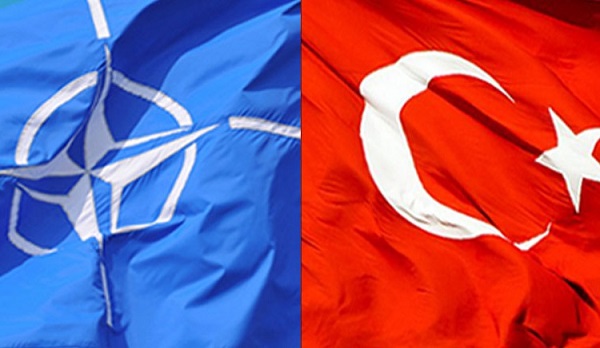Alwaght- With the Turkish invasion of northern Syria and even though Washington gave Ankara the green light for its campaign in the Kurdish-controlled regions, the development once again raises a debate on the necessity to review the traditional security and military alliance of the West with Turkey. In this relation, the evidence and news talk louder than the speculations.
In the first place, on Monday, the European members of NATO collectively condemned the Turkish attacks on northern Syria and one after another announced an arms ban on Ankara. The Associated Press on the same day wrote that as Turkey’s threats in the vicinity of the Mediterranean Sea ramp up, France and Cyprus design plans for joint military drills to address the danger posed by Turkey.
In another move, this time by the US, on Tuesday the US announced sanctions on the Turkish ministries of defense and energy. The sanctions also covered the ministers. The US President Donald Trump threatened Erdogan with even harder sanctions and in a stance unexpected by the Turks tacitly endorsed the Syrian army advances to the Kurdish regions. Moreover, the New York Times, citing sources in the State Department, claimed that the department is coordinating efforts with the Pentagon to remove 50 B-61 tactical nuclear bombs from the US-rented Incirlik airbase in Turkey.
Although the gap between the NATO and Turkey is never new and Turkey already widened it with pressing ahead with its S-400 air defense deal with Turkey or launching two anti-Kurdish operations in Syria, the question is that how long the West and Turkey can go on with their faltering alliance under NATO?
Can NATO expel or suspend Turkey?
Democratic Eric Swalwell of California on Tuesday blasted the Turkish operation in Syria and said expelling Turkey from NATO over its offensive “should be on the table.”
“Turkey has been an ally to the United States, but "I don’t think they’re an ally today,” he told CNN.
Another Democrat of the Congress, Eliot Engel, echoed the same threat against Turkey.
On October 13, the US Defense Secretary Mark Esper warned that the Turkish military action against the Kurds, who are Washington’s allies, could harm the relations between the US and Turkey.
But expelling a member is not as easy as it may look. Just unlike in the manifestos of the UN, the EU, and other regional and international organizations, NATO has no article specifying the conditions making one member subject to suspension, let alone expulsion. To date, NATO's mechanism to deal with inconsistency like that shown by Turkey has been revolving around the use of diplomacy and pressure until the member is back on the track of the NATO values and goals.
The US Secretary of State under President Harry S. Truman, Dean Acheson, who played a key role in foundation of the North Atlantic Treaty Organization, in a response to a question by the Senate about not including an article about members who could move to the Communism, as the rival ideology of the time, said that even if such a member not suspended from the bloc, the member states can cut off cooperation with it.
The official statements issued by the NATO member states, including that published during the 70th anniversary of the NATO establishment, repeatedly underscored the need for members to respect the common principles of the organization.
Here are the shared NATO principles: Democracy, individual freedom, and rule of law. By raising these principles, the Western countries could charge Turkey and pave the way for its suspension from NATO.
Whether or not Ankara has violated these principles is a question the key NATO members should answer. What is clear and serious is that Operation Peace Spring along with Erdogan’s threats to open the gates to refugees seeking a way to Europe can be deemed a violation of the NATO principles.
Mark Esper on Monday said due to Turkey's irresponsible actions, the risk to US forces in northeast Syria has reached an unacceptable level.
“I will be visiting NATO next week in Brussels, where I plan to press our other NATO allies to take collective and individual diplomatic and economic measures in response to these egregious Turkish actions," he was quoted as saying.
Is NATO a forever Turkey ally?
On the other side, the deepening distrust in the West and weighing up the benefits and harms of staying in the Western military bloc is a serious matter for the Turkish leaders. Ankara knows that it bears the costs of NATO membership while the other members are not only inconsistent with the Turkish interests in the region but also they have shown they leave it alone when it needs them. The Syrian crisis is an evident example of this gap. The arms purchase limits, the opposition to buying S-400 air defense systems from Turkey while canceling delivery of S-35 fighter jets, and recently the talks about taking out of Turkey the nuclear bombs all are factors making Erdogan determined in his way towards defense independence and even reducing reliance on NATO. In September he warned that the West should not stand in the way of Turkish goals. “If they woke up the sleeping giant, they will face the consequences,” he warned in September.
The collapse of the Intermediate-Range Nuclear Forces (INF), a Cold War-era treaty between Washington and Moscow, as a result of Trump pullout of it, the existence of nuclear-armed rivals like the Israeli regime, and also the Saudi nuclear ambitions all make Erdogan think that Turkey’s NATO nuclear protection will be dealt a blow if the military organization decides to remove its nukes from Turkey.
Neither Turkey nor the West is interested in a security-military divorce. But the course of developments moves in a direction that not only there is no outlook for improvement of the relations but also exit or expulsion of Turkey is not unthinkable.



























